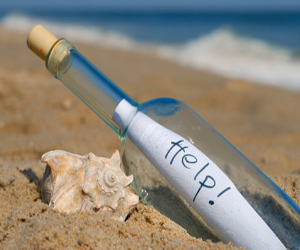26
2013
January 26 2013 |
Gold and Silver are for Crazy People 
It wasn't that long ago at a conference of people better off and smarter than me, that the subject turned to gold and monetary policy. I've since forgotten most of the conversation, but I remember very well the sentiment that seemed to prevail among those with whom I outed myself as a gold-bug lunatic (and I'm paraphrasing here): "Gold is for crazed libertarians waiting for the apocalypse" — a pretty standard, ho-hum response that any gold bug is used to hearing (gold was somewhere below 500 dollars at the time I might add.) But the line that really stuck with me, and that with hindsight is so incredibly meaningful for all sorts of reasons was: "I'm pretty sure that central banks are planning to sell all their gold." All their gold? Did I miss something? I was familiar with government agreements to sell some gold, but every last shiny gold bar? It was almost as if gold was that used recliner you couldn't wait to dump on the curb for the garbage collector. That sentiment speaks to the long hard slog gold and silver bugs still have ahead of us to actually convince people who aren't as insane as we of the need to hedge with real precious metal, since it's just a cold hard fact that less than 1% of peoples' wealth is in real physical metal (note my use of the words real and physical.) The attitude encapsulated in the sentence "central banks will sell all their gold" is still alive and well, as far as I'm concerned, here in the U.S. All the more so, I might add, now that the stock market has clocked one of its longest periods of outperformance relative to gold and silver since the precious metals bull began (sorry to remind the die hards out there, but since October 2011 the S&P is up roughly 25%, while gold and silver are flat to down—in the case of silver negative to the tune of 25%.) So yes, we, the gold and silver crazies are in the minority, still, somehow after everything the world has been through. This speaks to the power of persuasion, to the power of propaganda, in short, to the power of the very system that stood behind the notion that central banks would in no short time eliminate that barbarous relic, gold, completely, once and for all. And it makes me wonder, did western central banks in fact sell all of their gold? Is this why it is going to take seven years for the Germans to get some of theirs? Is this why a petition in Switzerland to find out "wo ist das Gold" is gaining traction? And what about all of those other central banks around the world who are now trying to increase their gold holdings, so much so that global central banks are now net buyers of the yellow stuff that some people think belongs on the curb? Where will this move to increase gold holdings take those of us who use U.S. dollars? (still most of the world I might add) Why is there such animosity to the idea that people should simply hedge—just hedge—with physical precious metal that you know exists? Is it so strange to want a real asset that stands outside the dollar reserve/fiat currency/commercial bank paper system—a mere 5 or 10% to help you sleep at night? Or is someone in fact desperate to cover up a much darker truth, one that has the potential to really shake the dollar reserve system to its core: namely, that the gold is really gone, sold off, or leased out a zillion times. Not just America's gold, but ancient, national treasures from Europeans and Latin Americans stored in this country. I suppose you could say that the U.S. still has military force backing its currency, and I have to admit that brute force is nothing to sneeze at. It is part of the basis for a reserve currency after all and it is why former reserve currencies, like the British Pound, the Dutch Guilder or the Spanish Real did not, in fact, experience Weimer or Argentina style hyperinflation as they were being replaced by other currencies for global trade settlement. (This still doesn't mean that these countries enjoyed the process, though.) But are Americans really happy with the fact that the only thing backing our currency is our ability to ram it down other people's throats? Or, that the U.S. has to continue to spend infinite amounts of money that its economy perhaps can't back up being the world's policeman, in order to justify having the world's reserve currency? Is a dollar collapse really as impossible as many professionals think? After all, people don't always act in their own self-interest, do they? If they did, catastrophes like World Wars I and II would not have happened. Will foreigners play along with the attitude that their gold can only exist on paper? You saw the reaction people had to the bailouts of banks that helped cause the financial crisis. So, to repeat: what would happen if news ever got out that several countries' gold, an asset that has been a reliable stand-in for barter for thousands of years, is gone? My journey writing about the precious metals markets arose from my own amazement that people I knew did not want to simply hedge with precious metal. I wasn't necessarily making arguments about an eminent dollar collapse, wasn't guaranteeing that the apocalypse was coming, but often found through the reactions of others that ownership of gold and silver (or debate about it) was often framed in apocalyptic terms. You were either for the paper system, or you were getting ready to move to a bunker in Idaho (no offense to those of you living in bunkers in Idaho, by the way.) Or, put differently, anyone who questions the current system is just, well, insane. Many in the intelligensia make the argument that debt doesn't matter, that government inflation statistics can be relied upon to tell us that there is no inflation, and that it is nonsense to think of US Treasuries as somehow dangerous investments. As we enter 2013, the continued push can be felt to double down on an existing welfare/warfare state and absolutely nothing is being done about the debt, again, because all appears to be well, at least from the stratospheric heights of those at the top. However, I want people to understand the hubris, or at least the complacency, still animating those trying to control and manage the world economy. Of course, their very careers and livelihoods, it would seem, depend upon believing they are in charge and everything is under control. And what the heck, the stock market looks poised to take out its 2007 highs, so isn't everything just fine? Maybe everything is just fine and I certainly hope that hyperinflation is not in our future. I hope that the decline of the dollar runs its course in less catastrophic fashion, like that of the British Pound in the mid-20th century. Still, those doubts of mine won't go away. I'll do my best to ignore them, or not let them ruin my weekend. At the very least, though—and especially for those speculators out there—you might remember that the stock market did outperform gold from roughly 1975 to 1977. But I also hope you remember that it was the beginning of the gold and silver mania. Who knows if we are that close to the mania, but markets—especially bull markets—do very strange things. Strange things like treating your national treasure as a used recliner destined for the curb.
Ryan Jordan currently teaches U.S history at the University of San Diego. He has previously taught at UC San Diego, Lafayette College, and Princeton University, where he received a Ph.D in 2004. He is the author of Silver–The People's Metal which recounts the past, present,and future of silver investing. His blog posts can be found at ryanpjordan.com
|
 |
 |
 |